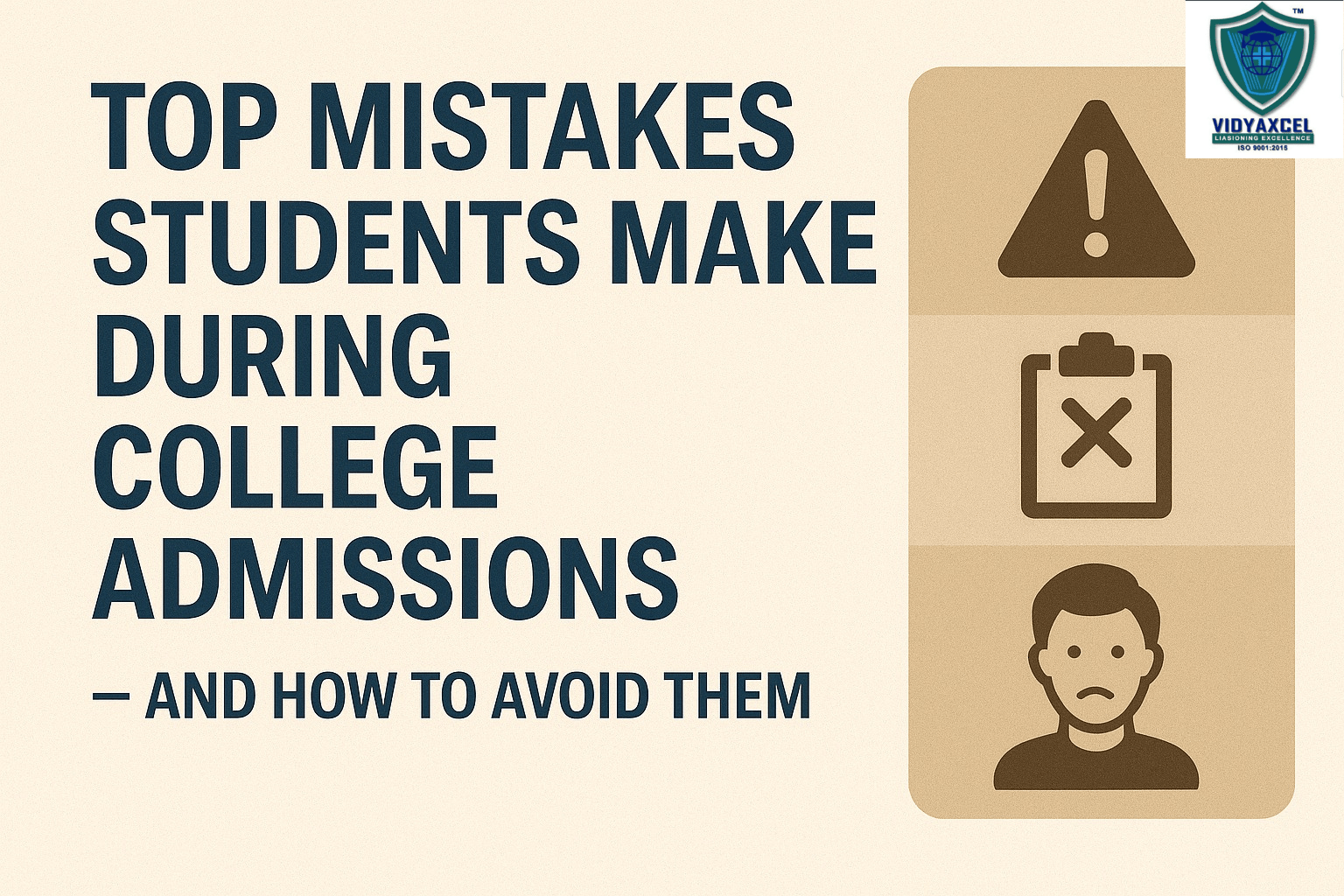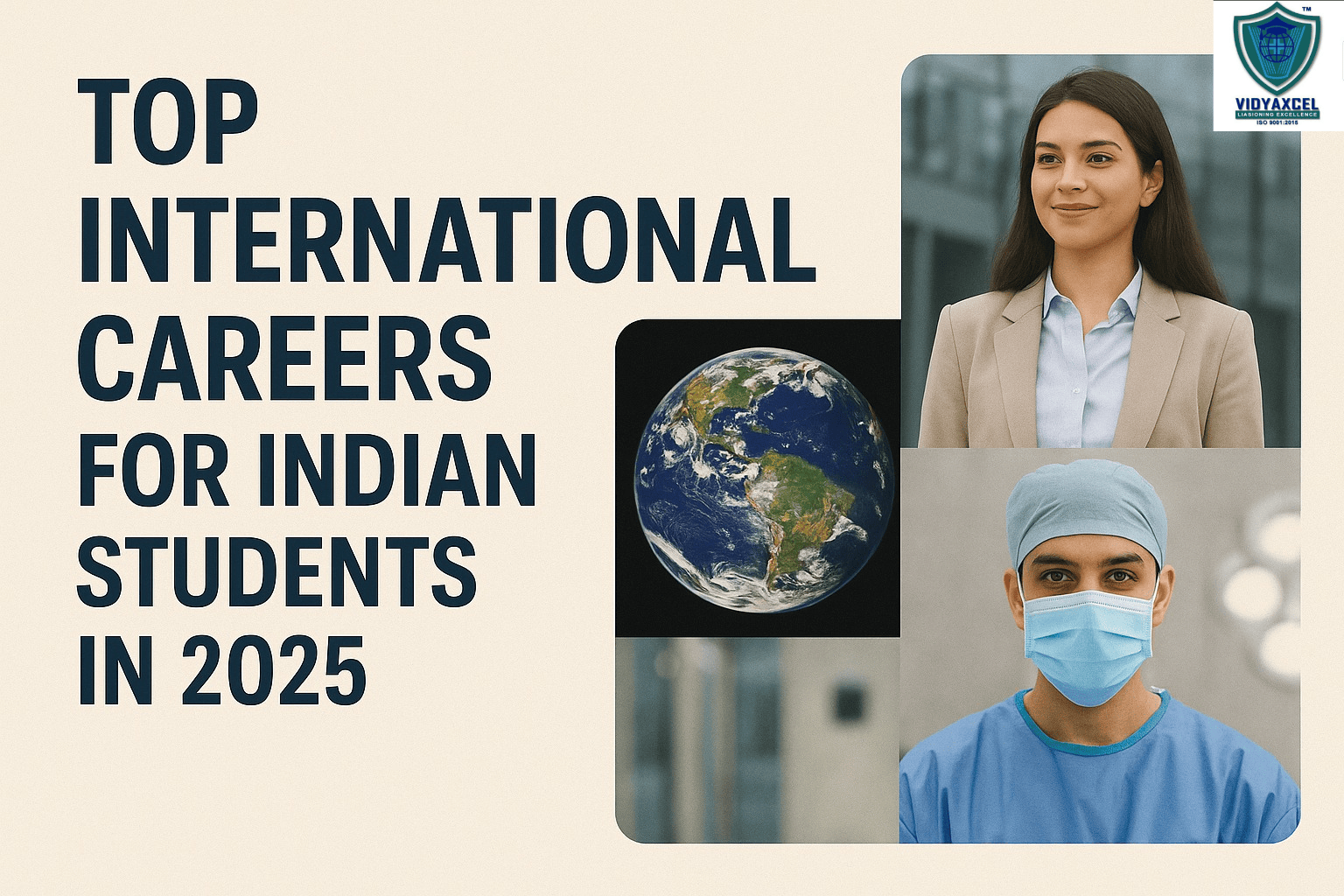Blog Details

28Jun
Top Mistakes Students Make During College Admissions — And How to Avoid Them
College admission is one of the most defining decisions in a student’s life. It can set the trajectory for their career, personal growth, financial future, and even social circle. With so much at stake, it’s no surprise that students—and their families—often feel overwhelmed.
Unfortunately, in this high-pressure environment, many students make avoidable mistakes that derail their admission goals. From choosing the wrong college to missing deadlines or being swayed by peer pressure, these missteps can lead to years of regret.
This detailed guide highlights the top college admission mistakes students make, along with expert strategies to avoid them. Whether you’re applying in India or abroad, this article is your checklist for a smart, stress-free, and successful admission journey.
Section 1: The 12 Most Common College Admission Mistakes
1. Not Researching Colleges Properly
The Mistake:
Many students apply to colleges based solely on brand name, friends' choices, or rankings—without understanding whether the college aligns with their personal, academic, or career goals.
How to Avoid It:
-
Use college search platforms to compare programs, campus culture, and placement stats.
-
Check official websites, attend webinars, or talk to alumni.
-
Look beyond top-tier colleges—sometimes lesser-known institutions offer better value in your specific field.
2. Ignoring Course Fit
The Mistake:
Students often choose a course due to parental pressure, societal trends, or a vague idea of "good scope"—without evaluating their own interests and strengths.
How to Avoid It:
-
Take career assessment tests and aptitude quizzes.
-
Consult a career counselor to identify suitable domains.
-
Choose a program where you see yourself growing, not just earning.
3. Missing Application Deadlines
The Mistake:
Students frequently miss deadlines for applications, scholarships, entrance exams, or document submission—jeopardizing their entire admission.
How to Avoid It:
-
Maintain a calendar with all important dates.
-
Set email alerts and reminders.
-
Start the application process at least 6–9 months in advance, especially for study abroad.
4. Poorly Written Personal Statements or SOPs
The Mistake:
Many students copy generic statements or rely on AI-generated SOPs without tailoring them to their journey, goals, or the college’s vision.
How to Avoid It:
-
Write authentic, well-structured, and engaging statements.
-
Highlight your story, motivations, and what you bring to the table.
-
Get your essay reviewed by mentors or counsellors.
5. Not Applying to a Balanced List of Colleges
The Mistake:
Students either apply only to elite colleges or only to easy-to-get ones, missing out on better options.
How to Avoid It:
Create a balanced list:
-
2–3 Reach Colleges (difficult to get in)
-
2–3 Match Colleges (suits your profile)
-
2–3 Safety Colleges (easier to get in)
6. Underestimating Entrance Exam Preparation
The Mistake:
Some students assume they’ll get through on school marks alone or underestimate how competitive exams like NEET, JEE, CUET, or SAT are.
How to Avoid It:
-
Start preparation early (ideally Class 11 or before).
-
Join a reputable coaching or online prep platform if needed.
-
Regularly practice mock tests and revise concepts.
7. Lack of Financial Planning
The Mistake:
Students ignore fee structures, living expenses, and funding options. Later, they realize they can't afford the college they've been admitted to.
How to Avoid It:
-
Estimate total cost (tuition + living + travel + books).
-
Research scholarships, student loans, part-time work options.
-
Create a financial backup plan with your family.
8. Being Influenced by Peer or Parental Pressure
The Mistake:
Following what others are doing or giving in to pressure can lead to choosing the wrong course or college.
How to Avoid It:
-
Reflect on your interests, not just what’s “safe” or “prestigious.”
-
Talk to professionals—not just peers—when making decisions.
-
Remember: You’ll live the consequences, not your friends.
9. Submitting Incomplete or Incorrect Applications
The Mistake:
Applicants often miss documents, upload incorrect data, or make errors in spelling, category codes, or subject choices.
How to Avoid It:
-
Triple-check every form and document.
-
Ask a mentor or parent to review before submission.
-
Keep physical and digital copies of everything.
10. Ignoring Alternative Pathways
The Mistake:
Students focus only on traditional degrees and ignore options like diploma programs, online degrees, study abroad transfer routes, or gap years.
How to Avoid It:
-
Stay open to hybrid or alternative pathways.
-
Talk to experts about newer options like dual degrees, co-op programs, or international twinning programs
11. Not Preparing for Interviews or Group Discussions
The Mistake:
Top colleges and programs often have selection interviews or GDs, which students ignore or underprepare for.
How to Avoid It:
-
Practice mock interviews.
-
Work on your speaking and interpersonal skills.
-
Stay updated with current events and practice expressing opinions logically.
12. Disregarding Mental Health and Burnout
The Mistake:
Overstudying, comparison stress, and admission pressure can lead to anxiety or burnout.
How to Avoid It:
-
Maintain a healthy routine.
-
Take breaks and stay connected with hobbies.
-
Don’t hesitate to seek help from a counselor if needed.
Section 2: Real Student Experiences
Story 1: Shruti’s Regret of Rushing
Shruti secured a seat in a top private college but later realized the course wasn’t aligned with her interest in design. She had followed her cousin’s advice and regretted not researching more.
Takeaway: Never substitute someone else’s dreams for your own.
Story 2: Arjun Missed the Scholarship Deadline
Despite scoring 94%, Arjun missed the university’s scholarship deadline. His family struggled to arrange funds later.
Takeaway: Financial planning and awareness are as critical as academic success.
Story 3: Karan Didn’t Prepare for Interview
Karan had great grades and applied to a top management program. But he froze during the final interview.
Takeaway: Admission isn’t just about marks—it’s about personality and communication too.
Section 3: How Parents Can Help
-
Encourage open communication rather than forcing choices.
-
Help organize application documents and deadlines.
-
Support emotionally during entrance exam results or rejections.
-
Assist in shortlisting based on family budget and child’s interests.
-
Avoid saying: “Do what everyone is doing”. Instead ask: “What makes you feel confident?”
Section 4: Expert Tips from Admission Counselors
-
Start early – At least in Class 11 or beginning of Class 12.
-
Keep backups – Apply to a mix of government, private, and international options.
-
Stay current – New entrance formats, eligibility changes, or college policies change often.
-
Focus on holistic profile building – Include extracurriculars, volunteering, or internships.
-
Stay authentic – Admission panels value honesty over perfection.
Conclusion
College admissions are a once-in-a-lifetime opportunity—but they don't have to be overwhelming. Most mistakes happen because of poor planning, herd mentality, or lack of awareness. But with the right information, mindset, and mentorship, students can make informed, confident choices.
Don’t let a few common mistakes steal your child’s future. Treat the admission journey not just as a process—but as a path to self-discovery and long-term success.
FAQs
1. What’s the biggest mistake students make during college applications?
The biggest mistake is applying without clarity—either about the course or the college. Students should focus on fit, not just name or trend.
2. Can I recover from a mistake like missing a deadline or choosing the wrong course?
Yes. Many students transfer colleges, change majors, or reapply next year. But it’s best to minimize such risks with proper planning.
3. How many colleges should I apply to?
Apply to 6–9 colleges across various tiers—2–3 reach colleges, 2–3 matches, and 2–3 safety options.
4. Do extracurriculars really help in college admissions?
Absolutely. Top colleges look for well-rounded candidates. Extracurriculars show leadership, passion, and time management skills.
5. What if my parents and I disagree on course or college choice?
Try to communicate openly, present your research, and involve a neutral third-party counsellor if needed. Respect and data can bridge many gaps.
Our Office: West Bengal, Maharashtra & Delhi.
For More Infomation about admission in Medical, Engineering, Management & Study in Overseas Details.
View Current Study Overseas, Medical, Engineering & Management Admission Details Video.




